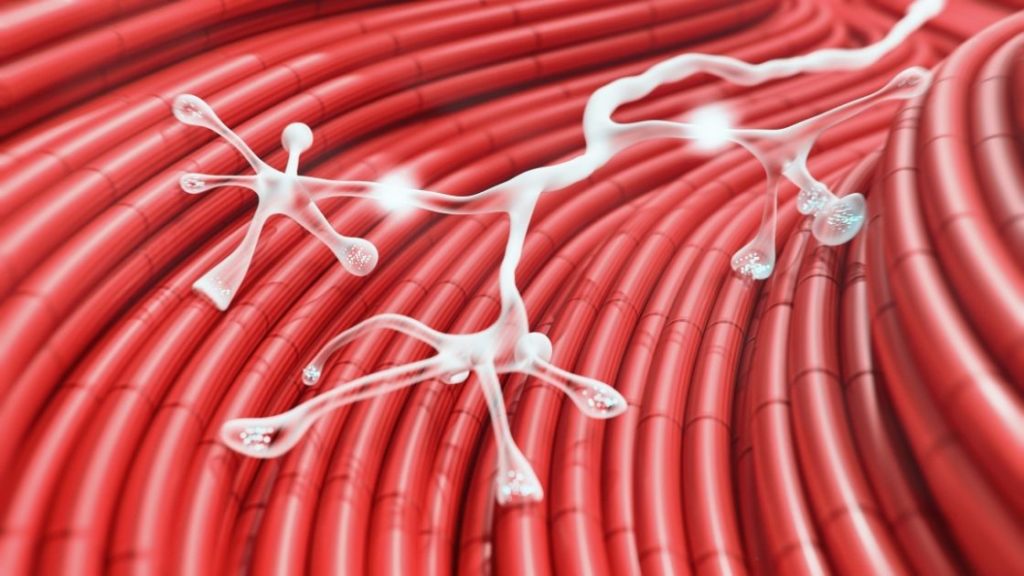Types of Pain Part 3: Nerve Pain

Nerve pain, when compared to bone and muscle pain, is pretty complicated.
When a nerve becomes irritated, the transmission of messages from the brain to the rest of the body is disrupted. This irritation can lead to impairments in muscular functioning, changes in bodily sensations, and (as the title implies) pain. Weakness and discomfort resulting from a damaged nerve is often called neuropathy.
Unlike the distinct sharpness of bone pain or dullness of muscle pain, nerve pain can present itself in various ways. Some people describe nerve pain as a shooting and stabbing sensation. Others say it burns, or feels like an electric shock. Tingling and prickling are likely to occur alongside it too. And numbness, though not exactly painful, is an uncomfortable symptom as well.
Nerve pain, in addition to its varying ways of announcing its presence, isn’t always as straightforward about its location as other types of pain either. Yes, nerve pain can occur near the site of injury or dysfunction, but have you ever heard of referred pain before? Referred pain is a radiating nerve pain that manifests itself at a site different from the injured body part. You’ve likely experienced it if you’ve ever received trigger point therapy, acupressure, or a deep tissue massage; cases in which referred pain flares when a trigger point is pressed on by the body work practitioner. However, referred nerve pain can also be a constantly occurring phenomenon, with or without palpation of the affected area.
Why does nerve pain happen and what are the treatment options?
Causes of Nerve Pain
- Direct Trauma: A severe blow to the body, such as a fall or sports injury, can sever a nerve.
- Underlying Medical Condition: Rheumatoid arthritis, hypothyroidism, diabetes, HIV, Celiac disease, and multiple sclerosis are examples of conditions that can cause excessive nerve compression.
- Medications: Neuropathy is a common side effect of certain medications. It’s important to note that, although uncomfortable, the resulting nerve pain isn’t life threatening. The drug related neuropathy will usually go away if the medications are discontinued, changed, or reduced. Medications for HIV, hypertension, cancer, and epilepsy have been linked to neuropathy.
- Substance Abuse: The toxic effects of alcohol consumption, in addition to malnutrition induced by heavy drinking, lead to nerve damage. Alcoholic polyneuropathy is one of the most common side effects of chronic alcohol use.
- Surgery: Post-surgical neuropathy occurs if a nerve is cut, bruised, overstretched, or inflamed during a procedure.
- Vitamin Deficiency: Some individuals, particularly the elderly, have trouble absorbing vitamin B12 from their food. Others, vegetarians especially, lack B12 in their diets. Vitamin B12 deficiency is linked to peripheral neuropathy.
Treatment Options
- At-Home Self-Care: If you suspect your pain is nerve related, be sure you’re taking care of yourself at home. Exercise, rest, epsom salt soaks, hot/cold therapy, and postural improvements are just a few easy ways to naturally ease the pain.
- Bodywork: Reap the benefits of chiropractic care, massage therapy, and acupuncture.
- TENS: Transcutaneous electrical nerve stimulation uses mild electrical currents to treat nerve pain.
- Medications: Nerve block injections are numbing agents used to relieve nerve pain. However, the relief tends to only last a few hours so it shouldn’t be the only treatment sought. Ask a physician about OTC drugs for nerve pain relief.
Now You Know!
Next time, we’ll talk about the final topic in the Types of Pain quadrilogy. You know all about bone, muscular, and nerve pain, and we’ll soon be digging into joint pain! Sounds fun, right?
As always, stay happy, healthy, and pain free!

Katrina Jenkins
Author, Licensed Massage Therapist
Katrina Jenkins graduated from Towson University in 2013 with a Bachelor’s Degree in Health Science and worked as a nurse’s aide briefly before pursuing her true passion. She graduated from the Massage Therapy Institute of Colorado in April 2016 with honors and completed the Touch of Healers Scholarship Program the following summer. She has been a part of the Moyer Total Wellness Team since the summer of 2017.
Resources
Borsook, D., Kussman, B.D., George, E., Becerra, L.R. and Burke, D.W. (2013). Surgically Induced Neuropathic Pain. Annals of Surgery, 257(3), pp.403–412.
Hoffman, M. and MD (2020). The Mystery of Unexplained Nerve Pain. [online] WebMD. Available at: https://www.webmd.com/pain-management/unexplained-nerve-pain-the-mystery-of-neuropathic-pain.
Hoffman, M. and MD (2021). Are there Injections for Back Pain? [online] WebMD. Available at: https://www.webmd.com/back-pain/guide/back-pain-injection-treatments.
Carol DerSarkissian, MD (2009). Nonprescription Treatments for Nerve Pain. [online] WebMD. Available at: https://www.webmd.com/pain-management/nonprescription-treatments-nerve-pain.
Sadowski, A. and Houck, R.C. (2020). Alcoholic Neuropathy. [online] PubMed. Available at: https://www.ncbi.nlm.nih.gov/books/NBK499856/.
The Foundation For Peripheral Neuropathy. (n.d.). Drugs Causing Peripheral Neuropathy – Medications List. [online] Available at: https://www.foundationforpn.org/what-is-peripheral-neuropathy/causes/other-drugs/.
Woessner, J., MD and PhD (2011). Referred Pain vs.Origin of Pain Pathology. [online] Practical Pain Management. Available at: https://www.practicalpainmanagement.com/pain/neuropathic/referred-pain-vsorigin-pain-pathology.
Photo Credit
Canva by koto_feja
